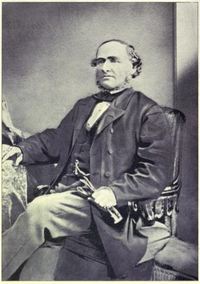
Source: Link
McLACHLIN, DANIEL (Donhuil), lumber merchant and politician; b. 1810, near Pointe-Fortune, Vaudreuil County, L.C., son of Hugh McLachlin; m. Maria Harrington in 1837, by whom he had four sons and two daughters; d. 6 Feb. 1872, at Arnprior, Ont.
Daniel McLachlin, the son of a Highland Scot Presbyterian, entered the Ottawa timber trade. The first record of his activity is in November 1834 when he and his brother William signed a contract with the timber exporting firm headed by William Sharples to deliver a raft of white pine timber to Quebec by 1 July 1835. Daniel may have been in the trade for some time before this: William Sharples and Sons, a large and successful house, would have been unlikely to deal with inexperienced timbermen.
The McLachlin business operated originally from Pointe-Fortune, Lower Canada. However, in 1837 Daniel moved to Bytown (Ottawa), Upper Canada, already the entrepôt of the Ottawa River timber trade. No longer working with his brother, he obtained extensive limits in the next decade on the Ottawa River, and on the Madawaska and Indian rivers. Restless and ambitious, he constantly expanded his business into new areas. He was among the first to employ the power of the Chaudiere Falls at Bytown, erecting saw and grist mills there with three run of stones. He was also a general merchant with his brother Hugh. Their store in central Bytown remained open until 1855 when they dissolved their partnership.
McLachlin truly began to build an empire in 1851 when he bought 400 acres of land along the Madawaska River near its junction with the Ottawa. This was the site of the near-ghost village of Arnprior, in Renfrew County. Founded in 1831, the settlement and its excellent millsites had languished for over a decade until McLachlin’s purchase. Setting up his timber business there, he reconstructed the mills, built bridges, and laid out and peopled a village. He took the lead in promoting public improvements which made Arnprior more accessible, such as the Madawaska River Improvement Association (later Company) and a wagon road from Arnprior to the Long Rapids on the Madawaska River. He moved to Arnprior himself in 1857, settling his family in a substantial two-storey stone house popularly known as “The Hill.” In this now-thriving community McLachlin built one of the largest and most prosperous firms in the Ottawa valley. By 1865, when his sons were brought into the business and it was given the name of McLachlin Brothers, his mills and timber operations employed 800 men and produced 25,000,000 feet of lumber, worth about $500,000 annually.
McLachlin combined his business ambition with a paternalistic concern for his settlement: he advanced adult education through the Mechanics’ Institute and the Ottawa Natural History Society; he was generous to the poor and to churches; he showed a continuing concern for improvements as a director of projects such as the Upper Ottawa Steamboat Company and the Bytown and Prescott Railway (later the St Lawrence and Ottawa Railway). Nevertheless, he remained a typically rough-hewn timberman. He shared the lumber community’s impatience with any restraints upon their business, their contempt for government attempts to regulate the trade. For instance, in 1856 McLachlin and several other major operators in the area found their logs caught in a jam on the Madawska River. In clearing the jam they calmly destroyed the recently completed Madawaska Bridge. There is a pathetic quality to the correspondence in which the Bureau of Agriculture attempted to convince McLachlin and his associates that it was their duty to rebuild the bridge or to pay for its replacement.
McLachlin entered politics in 1851 when the Reformers of Bytown chose him as their candidate. He ran as a moderate, “Baldwinite” Reformer, and on 10 Dec. 1851 was elected to the Legislative Assembly of the Province of Canada. He did not seek re-election in 1854, perhaps because he had been appointed the previous year as an associate justice in the Court of Oyer and Terminer for Carleton County. In 1861, by now a “Coalition Reformer” supporting the George-Étienne Cartier–John A. Macdonald* government, he was unopposed for the Renfrew seat in the assembly. His move toward the business-minded Liberal-Conservatives was typical of the pragmatic politics of the Ottawa valley, where principles took second place to the interests of the timber trade. Indeed, the only factor which could compete with the staple was religious antagonism. McLachlin discovered this to his sorrow in 1863 when he decided to contest the riding of Carleton. Despite a sound, business-like platform, he was easily defeated by the prominent Orangeman and Protestant agitator, William Frederick Powell. McLachlin returned to politics in 1867 when he was chosen by acclamation for South Renfrew to the first dominion parliament.
Daniel McLachlin was feeling the effects of his busy career. In June 1869 he resigned his seat in parliament. At the same time he retired from the lumber trade, turning the business over to his three older sons, Hugh, John, and Daniel. McLachlin himself retreated to the bucolic pleasure of his estate, happily listing himself as a “farmer” in the census of 1871. He could be well content with his life when he passed from it on 6 Feb. 1872.
McLachlin’s chief importance is not as a politician, for his career though long was undistinguished. He is significant as an example of the entrepreneur-paternalists who did so much to develop and settle the commercial frontier in Canada.
PAC, RG 31, A1, 1861, Arnprior village, 14; 1871, Arnprior village, 1, 41. PAO, McLachlin papers. Ottawa Citizen, 1851–72. Can. directory of parliament (Johnson), 422. Arnprior centennial, 1862–1962 . . . (Arnprior, Ont., 1962), 17–22. Cornell, Alignment of political groups, 31, 48, 50, 103–4, 109. [Charlotte Whitton], A hundred years a fellin’ . . . 1842–1942 (Ottawa, n.d.), 62–63, 133.
© 1972–2024 University of Toronto/Université Laval
Image Gallery

Cite This Article
Michael S. Cross, “McLACHLIN, DANIEL,” in Dictionary of Canadian Biography, vol. 10, University of Toronto/Université Laval, 2003–, accessed April 18, 2024, http://www.biographi.ca/en/bio/mclachlin_daniel_10E.html.
The citation above shows the format for footnotes and endnotes according to the Chicago manual of style (16th edition). Information to be used in other citation formats:
| Permalink: | http://www.biographi.ca/en/bio/mclachlin_daniel_10E.html |
| Author of Article: | Michael S. Cross |
| Title of Article: | McLACHLIN, DANIEL |
| Publication Name: | Dictionary of Canadian Biography, vol. 10 |
| Publisher: | University of Toronto/Université Laval |
| Year of publication: | 1972 |
| Year of revision: | 1972 |
| Access Date: | April 18, 2024 |









